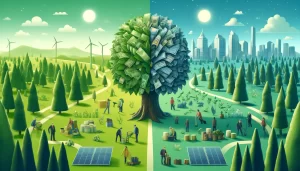Jakarta – The government claims to have reduced greenhouse gas (GHG) emissions by 118 million tonnes of CO2 throughout 2022. This figure exceeds the 2023 emission reduction target of 116 million tonnes of CO2.
Yudo Dwinanda Priaadi, Director General of New, Renewable Energy and Energy Conservation (EBTKE) of the Ministry of Energy and Mineral Resources (EMR), said in an official statement that the surplus emission reduction of two million tonnes of CO2 can be traded in the carbon market in the future because Indonesia has exceeded its target and “in line with Indonesia’s commitment and big ambition in reducing GHG emissions.”
Furthermore, he said, the energy sector contributes to reducing GHG emissions by 91.5 million tonnes of CO2 from the total emission reduction in 2022. This is achieved through energy efficiency, new and renewable energy, using low-carbon fuels, and using cleaner generation technologies.
Priaadi added that from year to year, the realisation of GHG emission reduction in the energy sector always increases. In 2019, the realisation of emission reduction was 54.8 million tonnes of CO2 from the target of 51 million tonnes of CO2. In 2020, from the target of 58 million tonnes of CO2, the realisation of emission reduction was 64.4 million tonnes of CO2. Then, in 2021, the emission reduction target is 67 million tonnes of CO2, while the realisation is 70 million tonnes of CO2. Finally, in 2022, the emission reduction target is 91 million tonnes of CO2, with a realisation of 91.5 million tonnes of CO2.
“Indonesia has set a target of achieving net zero emissions (NZE) by 2060 or earlier. To achieve this goal, funding and affordable technology will be important factors that require global support,” Priaadi said.
The Indonesian government has committed to reducing greenhouse gas (GHG) emissions following the global agreement in the Enhanced Nationally Determined Contribution (E-NDC) document. The target is to reduce GHG emissions by 32% or equivalent to 358 million tonnes of CO2 with national efforts and by 41% or equivalent to 446 million tonnes of CO2 with international assistance by 2030. (Hartatik)














